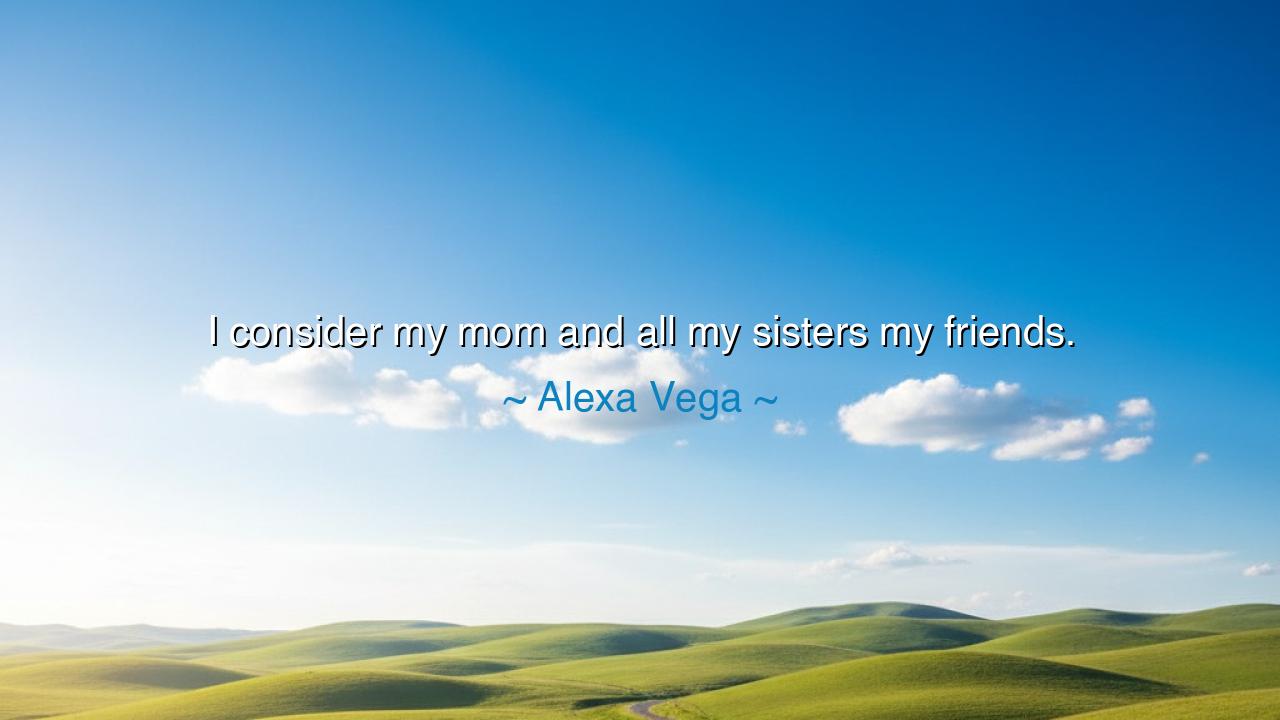
I consider my mom and all my sisters my friends.






In the ancient rhythm of life, where family was both hearth and compass, the words of Alexa Vega echo with enduring truth: “I consider my mom and all my sisters my friends.” These words are not merely a declaration of affection; they are a hymn to kinship, to the sacred bond that ties generations together with threads unseen yet unbreakable. In this saying lives the remembrance of an older wisdom — that friendship, when rooted in blood and spirit, transcends all other bonds, for it unites the heart’s tenderness with the strength of shared origin.
To call one’s mother a friend is to bridge the timeless gap between generations. It is to say, “I see you not only as the hand that nurtured me, but as the soul that walks beside me.” This sentiment shines like a lantern in an age where many hearts grow distant from their kin, where voices echo in separate chambers though under one roof. Vega’s words remind us that friendship is not confined to the young or to those who share our interests — it may also dwell within those who gave us life, who bore our burdens before we even knew their names.
And to call one’s sisters friends — ah, there lies another melody. Sisters, the companions of one’s youth, the mirrors of one’s growth, the keepers of both laughter and quarrel. When one rises to see them not as rivals in affection or difference, but as allies in the journey of life, one ascends to a greater understanding of love itself. The ancients spoke of this harmony as philia, the noble friendship that binds souls through virtue and understanding. In this, Alexa Vega speaks the timeless tongue of philosophers and poets before her — of those who knew that unity within family is the root from which peace in the world may grow.
Consider the tale of Cleopatra and her sister Arsinoë, whose love turned to strife, and strife to ruin. Their bond, once a shield against the storms of empire, was shattered by envy and ambition. History remembers their conflict, but let us imagine another path — had they stood as friends, the story of Egypt might have sung a different song. So too, in our lives, when we choose friendship over pride, tenderness over bitterness, we change the course of our personal kingdoms. The choice to love one’s kin as friends is not small; it is the act of rebuilding the ancient temple of trust that time so often erodes.
There are those who, in the quiet of their hearts, feel estranged from their families — who bear wounds of misunderstanding or neglect. To them, Vega’s words offer both comfort and challenge. Friendship does not demand perfection; it demands presence. It asks that we reach across the rift, even with trembling hands, to say, “Let us see each other anew.” For friendship, whether between blood or strangers, is born not from similarity, but from a shared willingness to understand and forgive.
Thus, the lesson is clear: Cherish those who share your blood, but honor them as friends who share your soul. Build within your home a circle of trust, laughter, and gentleness. Do not let the dust of years or the noise of the world harden your hearts against those who love you. Sit together in honest conversation; listen not only to words but to the quiet beneath them. Share labor and joy as equals — as fellow travelers on the same eternal road.
For when life grows heavy, it is not fame or fortune that steadies us, but the companionship of those who truly know us. In every home that remembers this truth, the ancient fire still burns — the fire that once warmed tribes, guided kings, and comforted poets through the ages. And so, let us guard that flame, as Vega herself has done, by calling our mothers, our sisters, our kin — our friends.






AAdministratorAdministrator
Welcome, honored guests. Please leave a comment, we will respond soon